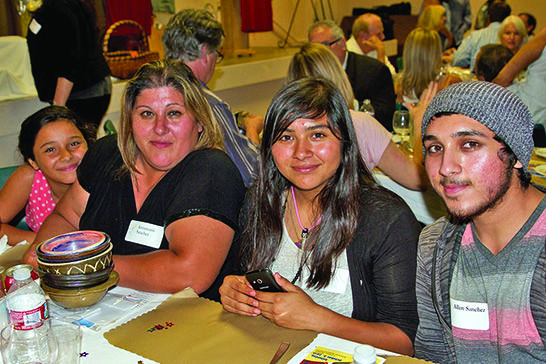On Oct. 3 at a Family Promise fundraiser, almost 300 people gathered to support homeless families in the South Bay. In the last two years, the area has seen a 39 percent increase in homelessness due to underemployment, lost jobs and rent increases.
Annamarie Sanchez, a single mom, told a room of church members of her struggle to care for her four children while homeless.
After Sanchez was wrongfully evicted from her apartment, she and her children were forced to live with her sister. But they were soon mandated to leave due to maximum capacity regulations. She and her children were homeless.
But thanks to support from Family Promise of Orange County Inc., Sanchez was able to keep her family together while applying for jobs. About a year and a half ago, Sanchez made it out of the shelter after successfully landing a job, allowing her to sign an apartment lease.
“She continues to do better and better,” said Casey Crosbie, executive director of Family Promise of Orange County Inc. “She got a job while she was with us. She was just promoted to a manager position and is flown to district manager meetings and has been successfully on her own for over a year.”
Sanchez says, “I am truly grateful to Family Promise because they gave me a second chance in life. I couldn’t have done it without them.”
Allen Sanchez, the eldest of her four children, said that being homeless made education “definitely very difficult because I was unable to stay in one school for a whole school year. It was hard to keep up with what they were learning.”
Allen graduated from high school in June after attending a continuation program. “What kept me motivated was seeing my mom working so hard to keep us fed or keep us sheltered,” he said. “I knew that being the man of the family I couldn’t let her down.”
Family Promise began in the South Bay after Julie Jacks heard about the Orange County affiliate program. She wanted to be part of a program that kept families together — homeless families are usually split up, with the men going to one shelter and the women to another. Children under 18 are turned away from most shelters, forcing the parents to place their children in foster care.
Jacks began raising funds two years ago with an annual Empty Bowls fundraiser, allowing the South Bay affiliate to open its doors to three families in May. Jacks serves as the vice president of the area’s Family Promise program.
This year’s fundraiser featured a silent auction with a variety of gift baskets, fine wines and spa products. Dinner guests enjoyed soup from donated ceramic bowls that they were invited to bring home. A live auction of weekend getaways took place after dinner.
The program houses families at different churches every week in the South Bay area. At American Martyrs Church, where the fundraiser was held, families have their own rooms and bathrooms at a former convent. However, most of the churches involved can only provide a parish hall where screens are used to give the families privacy as they spend the night on air mattresses.
Approximately 600 volunteers coordinate meals and games and help with homework and job training.
Crosbie, who attends the Church of the Foothills, says the Family Promise program builds bridges for congregations of different faiths.
“No matter what theology you have or what tradition you come from, every tradition talks about poverty,” he says.
“We have evangelical congregations that get angry if you say the Bible isn’t right, we have very progressive congregations where half the congregation is LGBT and everything between,” he says.
These people don’t usually have much to say to each other but when congregations work to help a homeless family, the different members start to bond.
“A lot of great conversations come out of that,” he says. “It’s an ecumenical building block to build relationships across this divide.”
In addition to creating interfaith opportunities, Family Promise also creates an eye-opening experience about homelessness. “Usually when people think of homelessness, they think of disabled vets, someone with PTSD,” Crosbie says. “Family homelessness is much more different than that. Most cases, both parents are working but they are working Walmart minimum wage jobs where they can’t make ends meet.”
Volunteers are surprised at how much the families are very much like them, he adds.
“And so I’ve watched a lot of beautiful relationships form between the congregations and the families that they serve.”
To learn more about Family Promise, visit their website: www.familypromise.org.

